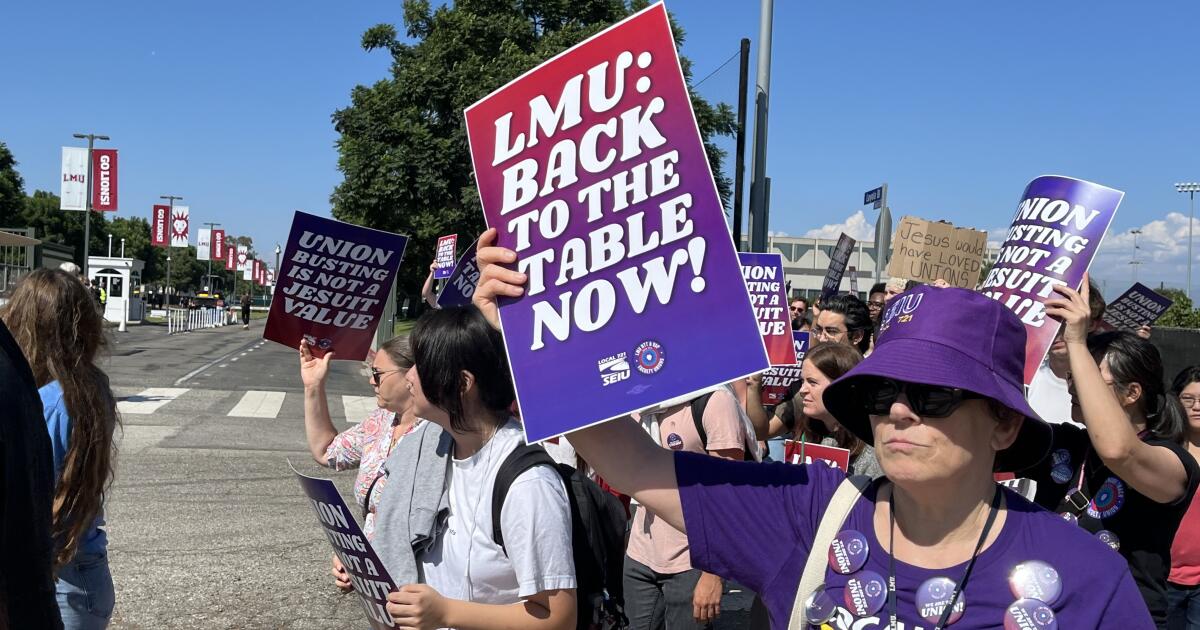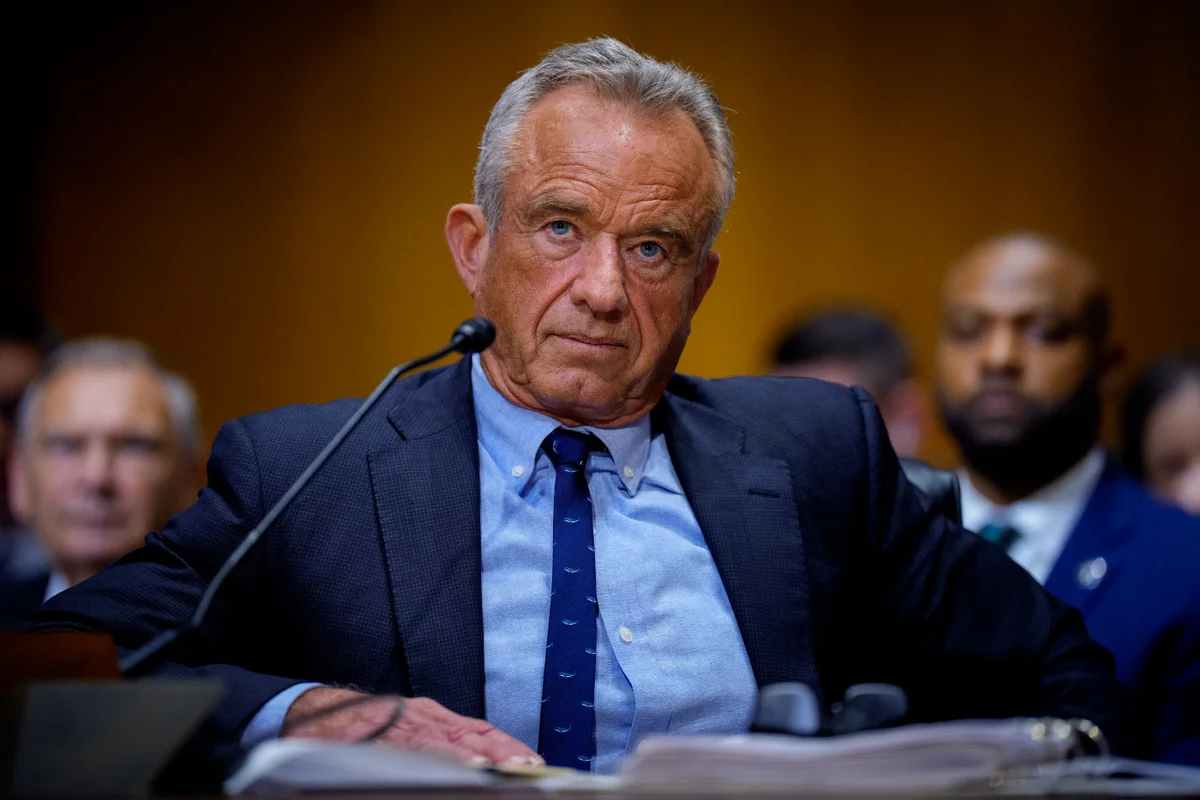
After 10 months of negotiations, Loyola Marymount University abruptly announced it would no longer recognize its faculty union.
The news, delivered in an email to students and employees on Friday, sent shock waves through the union, which represents nearly 400 part-time and full-time educators who do not hold tenure-track positions.
Paul S. Viviano, chairman of the university’s board of trustees, said in the email that the university was ending its engagement with the union by invoking its “constitutionally protected religious exemption” from the jurisdiction of the National Labor Relations Board, which governs collective bargaining for private employers.
“I was floored,” said Maureen Gonzales, 35, who has worked part-time as a dance instructor on campus since 2016 and serves as an elected member of the union’s bargaining team. “It’s outrageous.”
The U.S. Supreme Court has ruled that religious colleges are not under the purview of federal labor laws and need not recognize unions. Many religious colleges have chosen to do so voluntarily anyway.
But in recent years, several educational institutions — now including Loyola Marymount — have claimed the religious exemption suddenly and without warning, effectively using it to shut down established faculty unions that they had previously recognized.
Loyola Marymount’s announcement has sparked protest and drawn allegations of union-busting from faculty members as well as leaders of Service Employees International Union Local 721, the labor group that represents them. Unionized employees have accused the university of aligning with Trump administration efforts “to stomp out the labor movement,” and plan to file an unfair labor practice charge with the NLRB.
“Let’s be clear: This action is illegal,” said David Green, president and executive director of SEIU 721. “[F]aculty members will fight this with everything we have. LMU messed with the wrong union.”
Administrators are defending the move, arguing that getting rid of the union will help support the university’s financial health, and thus “protect [its] Catholic mission.”
Kat Weaver, the university’s interim executive vice president and provost, said that after months of bargaining and modeling the union’s proposals, the board of trustees found that the changes would force an 18% tuition increase, 300 layoffs and cuts to student programs, and determined “the responsible path was to invoke the religious exemption.”
The university’s move is “firmly grounded in law and the U.S. Constitution,” Weaver said in a statement to The Times. “This right cannot be waived and may be exercised at any point.”
Faculty members voted overwhelmingly last summer to join SEIU, citing issues of low pay and precarious job status. Many work on short, semester-long contracts across three colleges at the university: the Bellarmine College of Liberal Arts, the College of Communication and Fine Arts and the School of Film and Television.
They teach subjects such as animation, communications, dance, English, music, philosophy, photography, political science and screenwriting, among others.
On Tuesday, scores of staff members and union organizers rallied outside the entrance to the university’s campus in Westchester, which sits on a bluff overlooking the Pacific. Armed with signs reading, “LMU: Back to the table now,” and, “Union busting is not a Jesuit value,” they marched back and forth across Loyola Boulevard.
Bryan Wisch, a 33-year-old rhetorical arts instructor and alumnus of the university, said 75% of faculty in the union work part time on semester-long contracts for “poverty wages.” Those who work full time typically have slightly longer contracts that last one to three years, he said.
Wisch said he’s “one of the lucky ones” who works full time. Still, he said his annual pay of $68,000 isn’t sufficient to live in costly Los Angeles, and he’s taken on a second job to make ends meet.
Wisch said the university has disingenuously characterized the union as an outside party, even though the bargaining committee is made up of 15 employees elected from the three colleges.
The university said it is still committed to working with non-tenure-track faculty to improve conditions, but wanted to remove the “third-party intermediaries of SEIU and NLRB.” The university said it has already implemented salary and merit wage increases for non-tenure-track faculty that amount to an average 7.8% pay raise, retroactive to August.
“We are expanding full-time positions, strengthening contracts and promotion pathways,” Weaver said. “Respecting workers and workers’ rights and choosing a different governance path are not contradictions.”
Many Catholic universities teach social justice doctrines of the Catholic Church, which have a long history of support for organized labor. Pope Leo XIII in 1891 used the platform of the papacy to offer a spirited defense of unions and the rights of workers in his seminal encyclical, “Rerum Novarum.”
But while some Catholic universities embrace unions in line with such doctrines, others still object, said William A. Herbert, executive director of the National Center for the Study of Collective Bargaining in Higher Education and the Professions at Hunter College, City University of New York.
Typically, universities raise objections at the beginning of the union process, Herbert said. He called it “peculiar” that Loyola Marymount made an about-face after negotiating for months.
“It raises questions as to the actual motivations. Is it a sincere belief unionization will interfere with the religious education of the school? Or is it to avoid having to engage in collective bargaining?” Herbert said. “It does not sound to me that they’re concerns of religious liberty.”
Joshua D. Nadreau, an attorney and regional managing partner at the law firm Fisher Phillips, said the motivation may not ultimately have weight, since the labor board, even with a Democratic majority, has sided with universities on this issue in recent years.
“I don’t foresee a real avenue for actual relief here,” Nadreau said “Courts are incredibly reluctant to weigh in on the authenticity of religious practices.”
Some 600 Catholic institutions across the U.S., including universities, hospitals and other medical facilities, are unionized, according to a 2024 report by the Catholic Labor Network.
A 1979 Supreme Court decision regarding the Catholic Bishop of Chicago ruled that the NLRB should not seek to regulate religious institutions, arguing that problems with religious freedom protections enshrined in the First Amendment can arise when a government office tries to determine if certain activities are religious or not.
In the decades since, rulings by federal courts and the NLRB have focused on creating a standard to deem whether a school is a religious institution, and whether the labor board can assert itself when it comes to employees who are not involved with its religious mission.
Recent rulings have further curtailed the NLRB’s reach. A U.S. Court of Appeals in 2020 blocked the board from requiring that Duquesne University, a Catholic institution in Pittsburgh, recognize an adjunct faculty union because it could lead to an “intrusive inquiry” that could infringe on the institution’s religious protections.
In 2021, St. Leo University in Florida moved to nix its 44-year-old faculty union. The union contested the withdrawal of recognition, arguing the university changed the terms and conditions of employment without the union’s consent in violation of federal labor law.
But in 2024, the NLRB sided with St. Leo, saying it could not exercise oversight at the religious institution.



